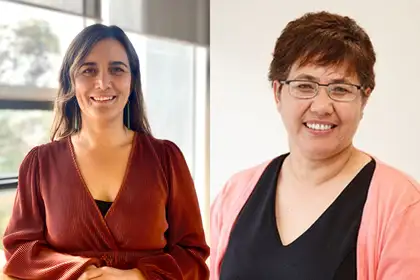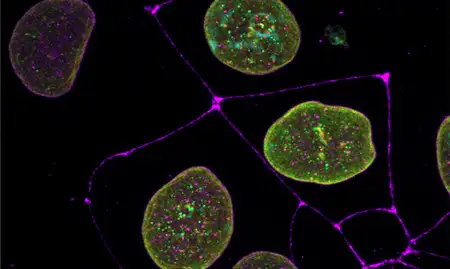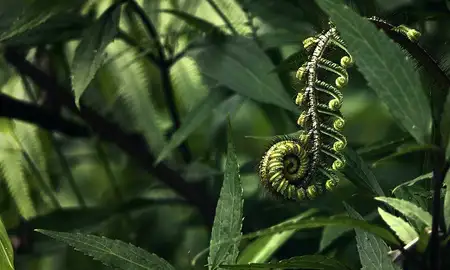
Dr Elle Brittain (left) and Dr Monica Koia.
Dr Elle Brittain, Ngāti Kahungunu ki Te Wairoa, Ngāti Rakaipaaka, and Dr Monica Koia, Nō Ruawaipu, Ngāti Porou, Ngāti Kahungunu, Te Arawa, Ngāti Raukawa ki te Tonga, have each been awarded Emerging Researcher First Grants from the Health Research Council of New Zealand (HRC).
These grants provide three years of support to emerging researchers seeking to establish independent health research careers in Aotearoa New Zealand.
Dr Elle Brittain – Kaupapa Māori behavioural health intervention for harmful substance use
Dr Brittain’s research will develop and implement a Kaupapa Māori approach that draws on behavioural models to be responsive to Māori and to work toward whānau ora.
Collaborating with Dr Simon Bennett, Ngāti Whakaue, Patu Harakeke, Ngāti Waewae, from the School of Psychology, Dr Brittain will work with the addiction and mental health sector and Māori community partners in Wellington to deliver evidence-based practice for harmful substance use that is contextualised to Māori cultural needs and experiences.
The research project’s short-term impacts will directly benefit participants’ health and foster partnerships with the region’s addiction and mental health sector. The broader goals are to facilitate positive impacts to Māori health and communities, to offer options to improve upon current service provision in addiction and mental health, and to have implications for policy decision-making.
Dr Brittain says she is excited by the opportunity to bridge the clinical and academic worlds, particularly with culturally-grounded and clinically-informed practice.
Given the challenges New Zealand’s mental health sector faces, and with only six per cent of Māori within the clinical psychology workforce, this funding provides a huge opportunity to elevate a Māori model of care.
“Māori first and scholar second. I know the issues affecting our Māori communities well, and I think this research will have a meaningful impact in this space,” Dr Brittain says.
She welcomes the research challenge in front of her, especially knowing that she is well-supported by her colleagues and supervisors.
Dr Monica Koia - Timely access to rongoā Māori in cancer care services for Māori
Dr Koia will collaborate with Robbie Richardson, Pou Rongoā for He Puna Hauora, and Māori health and iwi providers in Horowhenua, Manawatū and Tararua.
They will explore the ways in which Māori health consumers, cancer patients and whānau can have timely access to rongoā Māori, the traditional Māori way of healing, when seeking cancer care.
Rongoā Māori is a diverse practice that can include karakia (prayer), wai (water), waiata (song), himene, whānau and access to the ngahere (forest) and whenua (land). Underpinned by tikanga Māori, Dr Koia will co-design the research with the participating Māori health and iwi providers.
This research will positively contribute to the advancement of Māori health by reducing inequities and improving health, social, economic and cultural aspects for Māori health consumers, patients and their whānau. The mahi will also enhance awareness of timely access to, and integration of, primary and secondary cancer care with rongoā Māori.
Dr Koia is passionate about the opportunity to reconnect and work with Māori health consumers, patients and their whānau, Māori health and iwi and health professionals within the regional areas.
“The goal is to look at how Western cancer care services can be integrated into rongoā Māori, to enable rongoā Māori to be at the forefront of access to cancer care services,” she explains.
“Many of our people want to be able to access rongoā early when engaging with cancer care services. However, the Western health system does not understand the importance of rongoā to Māori wellbeing. Our people are rarely made aware of or referred early to a rongoā Māori practitioner at their cancer care journey outset. This collaborative rangahau [research] will raise awareness, bring better understanding and make it equally accessible alongside the Western practice.”
Dr Koia also anticipates building her leadership skills to manage a research project that includes Māori community research staff, who she wants to encourage to do their own research and apply for their own grants.
Related news
Researchers awarded Māori Health Research Emerging Leader Fellowships
Two Te Kunenga ki Pūrehuroa Massey University researchers from the SHORE & Whariki Research Centre have been awarded Emerging Leader Fellowships from the Health Research Council (HRC).

Cellular ageing research awarded Health Research Council Explorer Grant
A research project looking at ageing at the cellular level has been awarded one of 17 Explorer Grants by the Health Research Council (HRC) of New Zealand.

HRC funds study of mātauranga Māori (traditional knowledge) of nutrition-related wellbeing
Dr Nikki Renall, Taranaki, has been awarded a Māori Health Research Postdoctoral Fellowship grant from the Health Research Council of New Zealand.
